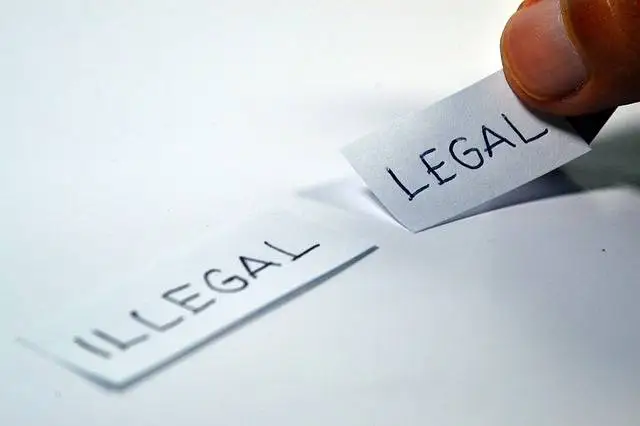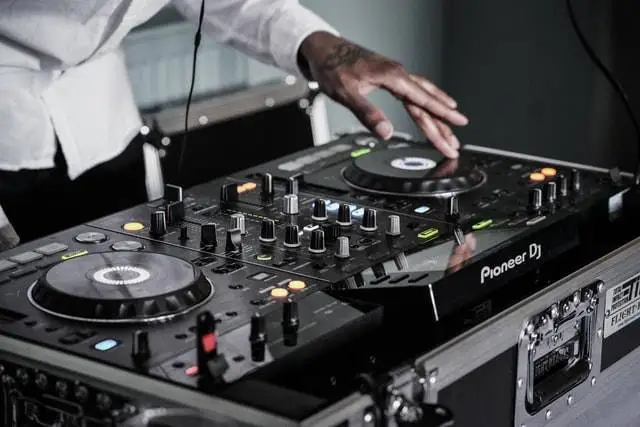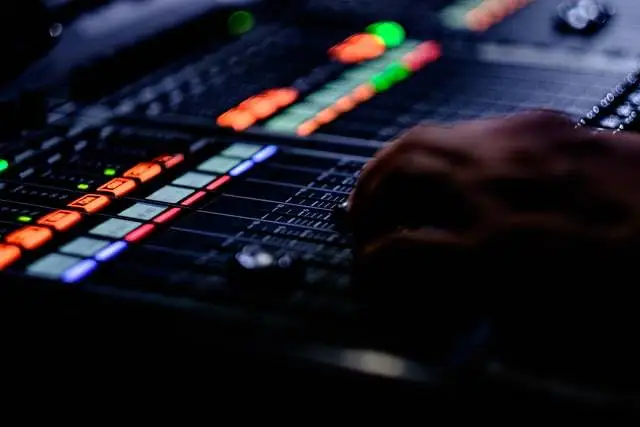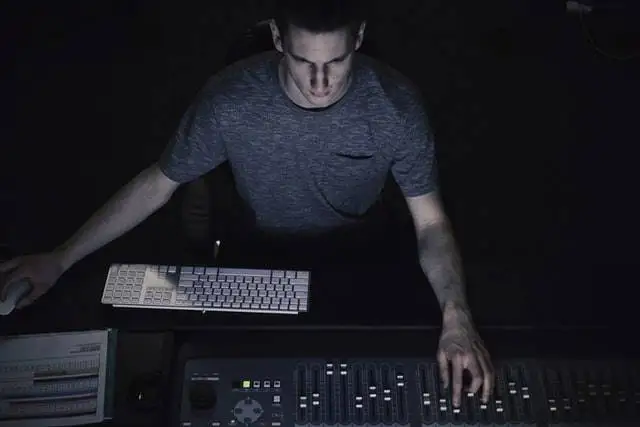If you've been looking to remix one of your favorite songs and make the best remix possible, then you're in the right place.
Unless you have a decent understanding of electronic music production basics, then you're probably going to have a hard time remixing a song. The beauty of making remixes is that the process is pretty straightforward.
In this guide, we're going to go through everything you need to know about how to remix a song so that by the end, you'll have all of the knowledge and tools you need to make the best remix possible.
What Is A Remix?
A remix is a track that has been contorted or altered in such a way that it is reminiscent of the original song, though has been changed so much that it stands as its own, separate entity.
A producer will get stems from original songs, which are individual audio files (bass, vocals, guitar, drums), and compose and arrange them in a way that they create a final track.
Why Would I Want To Remix A Song?
Yes, you could continue to only put out original tracks and never make a remix in your life, which is totally fine. Trying to enter remix contests with hundreds or thousands of other music producers just to land a spot on your favorite artist's remix album seems difficult right?
Well, if you think about it, you're up against the world anyway when it comes to being a music producer, so working with stems from experienced producers for a chance to land a spot on an album or EP, or simply win a remix contest, is an excellent opportunity.
Winning a remix competition is a great way to get your name out there and enhance your reputation. Some remix competitions open the doors up to labels or other big artists.
A lot of time, remix competitions will publish an official remix on an EP or album, giving the music producer even more exposure. Of course, it is important to know how to set yourself apart as a remixer, which is what we would like to discuss in this article.
First, however, let's talk about the legalities of remixing.
The Legal Aspects Of Remixing a Song

Is It Legal To Remix a Song?
It is illegal to take a random song, remix it, and share it online without permission. Even if you only use a split-second of that track, you need permission from the song's copyright holder to redistribute it.
Just because you are posting to free streaming sites like SoundCloud and YouTube does not mean that it is legal.
What Is The Difference Between a Bootleg and a Remix?
Many producers often inquire about the difference between bootlegs and remixes. An official remix is something that an artist or record label pays or asks a producer to make.
A bootleg, on the other hand, is an unofficial iteration of the song, which is typically illegal. DJs will often make bootleg copies of popular music to play at live shows.
When it comes to selling music, bootlegging is illegal, even though many producers share bootleg remixes online.
How Do I Get Permission To Remix a Song?
One way that you can get permission to remix a song is by entering remix competitions that are open to the public, as they provide public permission and stems. You can also reach out to the original artist and ask for their permission. If the original artist is unsigned or part of a smaller label, getting permission to remix their song might be pretty easy.
For big labels, you might have a difficult time, as they tend to be far more protective of their works.
What If I Don't Get Permission?
Let's say that you can't get permission for the song you really want to remix. Maybe the artist isn't getting back to you or there aren't any remix competitions out with the song. Maybe the person did reply and said you could NOT remix their track.
Whatever the case is, if you were not given permission to create a remix, you cannot do so legally.
Will you get arrested or fined if you do? VERY unlikely.
Of course, there is the risk that your song will get flagged from the streaming site for copyright infringement. This happens all the time on sites like SoundCloud and YouTube. If this happens to you often, the platform might just shut your account down altogether.
What Do I Need To Remix A Song?

Stems
To remix a song, you will need the stems. As we said before, stems are the individual audio tracks from the original project file.
These stems can be found in a number of places, including DJ Pools, sample packs, and remix contests.
You might start by checking out Loopmasters or Splice for sample packs, as you'll be able to find thousands of high-quality sample packs that you can use to remix publicly. From vocal chops to full-on licks to drum grooves, these sites have it all. Plus, you never have to worry about the legality of using a sound you download off of these sites in your remix, as they are free from copyright.
To find acapella tracks or the original vocals from popular songs, you might want to try websites like Acapellas4U, DJ City, or BPM Supreme. Having vocal stems can come in handy when trying to craft high-quality remixes.
Lastly, you can find stems through remix competitions. An artist or label will often provide a popular website or platform with existing stems for producers to work with. Because they have given public permission for producers to use these stems, it is completely legal and even encouraged.
Digital Audio Workstation (DAW)
When choosing a DAW for your remix, there are a lot of options. Producers often ask us,
Can I remix songs on Garageband?
Can I remix songs on Audacity?
Can I remix songs on Ableton?
You get the point.
The thing is, you can remix a song on just about any type of music editing software, whether it is Audacity, Garageband, FL Studio, Pro Tools, or Ableton. There are even mobile apps that you can use to remix songs.
How to Remix a Song In 7 Steps
- Pick the right track
- Figure out your direction
- Figure out the key and BPM
- Prep your stems
- Choose the stems you want to use
- Craft your remix
- Mix and master your remix
1) Pick the Right Track
When picking an original song to remix, it is important that you choose your song carefully. We recommend only remixing songs that you like. If you hear an original song and your first thought is to change it up completely, then you should probably go with another track. An original song should already feel exciting to you to the point that you want it to use for an official remix.
When looking for songs to remix, look for:
- Songs that have catchy hooks (synth leads, vocals, basslines). It should be memorable enough that no matter how much you alter it, listeners will know what it is.
- A BPM that isn't more or less than 10BPM from your track.
Classic tracks can be a great choice if you are a DJ that is trying to get exposure at the club, such as an old Motown song or a 90s throwback.

2) Figure Out What Direction You Want To Go
As you sit down to create your remix, think about the direction that you want to go. Do you want your remix to be something people can chill out to or do you want it to blow people's eardrums in the club?
If you're looking to win remix competitions, then you might need to consider the artist, label, or company that put out the contest to see what they are looking for.
3) Figure Out the Key and BPM of the Original Song
When you get the stems for the original song, you need to do some digging to figure out the key and BPM of that track. The majority of the time, remix competitions will provide this information. However, if you're making bootleg remixes, you might have to figure it out on your own.
Knowing the key can help you work much faster, in that you'll be able to find samples and chord progressions that mesh well with the hook on the original song. An easy way to ruin a great remix is by using sounds that aren't in the right key.
TuneBat is a great place to find information regarding the key and BPM of an original song.
4) Prep Your Stems
The stems are the individual pieces of the original song that are usually supplied to a music producer for a remix. These stems are separate files that you can chop, mangle, and mix to your liking to create a unique sound.
Typically, stems are broken down into several categories, including bass, drums, vocals, keys, guitars, FX, etc. Start by arranging the stems in your DAW and line them up so that you can see what you have to work with.
In organizing your stems, you'll be able to see which of the elements you should use in your remix, as well as which elements you can scrap.
5) Choose The Stems You Want To use
Once you have your stems organized, you will want to put some thought into which stems you should use. You will have more freedom to get creative with your track the fewer stems you decide to use. This can be great if you want to impart your own sense of musicality and creativity on the track.
Of course, you don't want to get rid of the original too much, as it can lose the sense of being a 'remix.'
First, you'll want to decide which of the stems must stay in the remix. For example, if you decide that the original vocal is a necessary component of your remix, keep that stem in your session. You can (and maybe should) process, chop, and rearrange this vocal in the future, but just make sure that it is there and remains recognizable.
Next, figure out which of your signature sounds you want to use, whether it is a synth lead, a synth bass, or a few drum samples, to see how they fit with some of the original stems.
Lastly, get rid of the unnecessary parts that don't fit with your signature sound. For example, if your signature sound is funk guitar and the song has some washy, reverb-drenched guitars, you might consider removing those stems.
6) Crafting Your Remix
The way in which music producers remix a song will differ from producer to producer. However, for those just starting out, we figured we'd provide you with a few ideas as to how you can begin crafting a quality, creative remix.

Mess With the Melody
You could start by taking the existing melody and using a different instrument to represent it, keeping the same notes while changing the order that they are played in. If it is a four-bar melody, maybe consider looping the first bar three times, reversing the second bar, and letting the fourth bar turn it around back to the beginning.
You might even consider keeping the original melody, though heavily processing it so that it gives the listener something fresh. Vocal chops are great for this, as you can simply maintain the original melody while altering the rhythm or sonic characteristics.
Use Your Chord Progressions
One incredibly unique way to remix a song is by building your own chord progression under the existing melody. Of course, you might need some basic knowledge of music theory to alter the chord progression, though you can also try and work by ear, as many music producers do.
You could even change the way that the chord progression is played underneath the melody. For example, the original song might have a sustained bassline acting as the foundation. You could take the same notes and use your own bass or synth bass to give it a funky, syncopated vibe.
Use You Own Drum Samples
You might consider focusing on the rhythm of the drums first if you plan on remixing your song with a different BPM altogether. In doing so, you'll be able to build melodic ideas on top of it based on the rhythm.
By placing your own drum samples underneath a melody, you can figure out the energy level and groove to help you envision the rest of your remix. Plus, you can use your drums to put your own sonic stamp on the remix.
7) Mix and Master Your Remix
You might be able to make an incredible remix, though if you can't present it in a polished manner, then it won't stand up with other remixes out there. You need to mix and master your track.
Labels will often master all of the remixes they receive together so that they have a similar sound from one to the next. However, you must still provide them with a polished mix.
If your remix isn't for the label, then you'll have to make sure you get it mastered on your own .
You can either choose to mix and master on your own or send it to professionals to get it done. We highly recommend sending your tracks to professionals, as they can look at it from an objective standpoint, using tools like EQ and compression to help all of the individual parts feel cohesive.
Elements of a Great Remix
There are no golden elements of a great remix that we can give you, as remixes are often very different.
What we can provide you with, however, is examples of great remixes that can give you ideas of where to go.
For example, let's look at Mark Ronson's remix of Angel Olsen's "New Love Cassette." Mar Ronson took this deep cut from Angel Olsen's All Mirrors album, stripped it back, and added a ton of synth sounds to it to make it unique.
Ronson even throws listeners a curveball with a doom-like wall of synths during one passage.
In another instance, St. Vincent remixed one of the lead singles off of the new Beck album, Hyperspace. Annie Clark, the lead singer of St. Vincent, decided to add some playful, rhythmic elements to the track, imparting some uniquely 70s elements on this radio hit.
One of the most surprising remixes in recent days was the Totally Enormous Extinct Dinosaurs remix of LA Priest's "Beginning" off of the artist's second album GENE.
This track was an absolute standout on the album, bringing funky and lo-fi bedroom pop vibes to the masses. Of course, in expected fashion, British DJ and producer Totally Enormous Extinct Dinosaurs took the song and gave it a complete makeover, turning it into a hi-fi club hit.
How To Win Remix Competition
When you enter remix contests, you will usually give your track to judges. These judges are often looking for a creative take on the original song. You don't want to stray so far from the original song that the remix begins to compete with it. Try to make it as complementary as possible.
Think of ways in which you can slightly alter original songs, making them slower, faster, harder, softer, better for the club, or chilled out.
In a remix contest, the judges will listen to hundreds, if not thousands of submissions. They want something that will pique their interest. By providing them with a creative and unexpected twist, you will stand out from the crowd.
We recommend looking at what other remixers have done for the particular artist that you are remixing, as it will give you some insight into what they've liked in the past.

Here are a few ways in which you can get creative to stand out in a remix competition:
- Sample original sounds in the song and use them as transitional elements
- Chop up the vocals in a unique way
- Create a different groove with the percussion sounds in the original
- Raise or lower the pitch of your remix with warp mode
- Drastically change the sound of the original stems with heavy processing
It is all about being unique and distinguishing yourself from the many remixes that the judges are listening to while highlighting the original magic of the song. Failing to do either of these things will likely land your track in the trash pile.
To a certain degree, the amount of public support your remix gets is important too. If the remix competition is based on votes, get as many people to vote for you as you can, including family, friends, and acquaintances.
Pro Tips For Making Remixes Faster (And Better)
Set a Deadline For Yourself
When it comes to making an official remix, an artist or label will typically provide you with a deadline for when they want the track completed. The same thing goes for remix contests. If you're making your own remix, you must set your deadline on your own.
We recommend setting a deadline from two to three weeks and STICK TO IT.
Of course, this doesn't mean you should rush it. Just use the spare time that you have available to work on your remix. Make sure to send it out to friends that you trust to get their opinions and critiques.
Use The Best Elements of the Original Track
If you have a good remix, the listener should immediately recognize the original track that it came from. It is up to you to make sure you pick the right parts. For your standard pop track remix, you might take just the vocal. If you're remixing an instrumental track, you might go for the lead guitar, bass, or synth.
Ask yourself,
What makes the original track special?
Your remix should be built around that thing.
For the most part, as long as you have the original vocal in your track, you probably won't have to use any other parts. Of course, if you can use as many parts of the original track as possible, then that's a good thing!
For electronic music, however, we always recommend using your own drums to differentiate it.
Know Your Key and Tempo
When remixing an original song, know what key it is in and what tempo it's at so you can fit it into your remix. Yes, you can always time-stretch the various elements or re-pitch them, but those kinds of tools can only work so hard before things start to sound wonky and unnatural.
On the other hand, if you're going for a chipmunk vocal, then by all means go nuts!
For the key, we recommend keeping it with three whole steps of the original song. For the tempo, +/- 20BPM is usually a good starting point.

Re-Play The Hook
The original song that you work with might have a really catchy hook that sounds great for the original track, though doesn't work as well for your particular genre. In that case, you might decide to re-do the hook with an instrument that better suits your vibe.
For example, as a deep house artist, you might choose to re-play the original hook a reverb pluck. As a trance artists, on the other hand, a larger-than-life supersaw might be a better choice.
K.I.S.S.
Keep It Simple Stupid!
Sorry if that was a little mean. It's just one of our favorite acronyms for reminding ourselves when we've gone too far!
You don't want to go so far that you've completely obliterated the original track. Just make sure you have the hook present in your remix and that it sounds like you.
Start with the hook and build the remix around it to make it sound as concise and cohesive as possible.
Listen To Other Remixes
If you aren't sure where to start, or if you get stuck in a roadblock during the remixing process, go and listen to some other remixes to gather some ideas. In doing so, you can get an idea of how that particular music producer is using the hook or arranging the track.
Put a Unique Twist On It
By using signature elements and sounds, you can give your remix a personal touch. If you've spent time developing your own samples, presets , and processing chains, then this should be fairly easy.
Plus, using sounds and elements that you are already familiar with can help speed the production process up. Never be afraid to reuse sounds that you've used before, as they will sound different in different contexts!
Fans of yours will recognize those sounds right away and know exactly who they are listening to. Of course, don't be afraid to intersperse new and creative sounds with your usual suspects as well.

Song Remixing FAQs
Is It Legal To Remix a Song?
It is not legal to simply remix a random song of your choosing and share it online. You must get permission to utilize the portion of the original song in your remix, no matter how insignificant the portion of the song is.
Can I Remix Music And Put It On YouTube Without Getting Sued?
If you get permission from the label, artist, or whoever owns the copyright to the song to remix it, then remixing a song and putting it on YouTube is legal. However, if you don't get permission and share the song anyway, you could find yourself with legal troubles.
How Much Does It Cost To Remix a Song?
Depending on how long and complex the remix is, you can expect pay anywhere between $200 and $400 for a remix. This typically amounts to 4-5 days of work. However, the rate can drastically change based on the producer and whether or not it is an official remix or not.
Can Audacity Remix Songs?
While Audacity isn't the best software for making a good remix, you can import an existing song into Audacity and work with the audio to remix it. Many people even use Audacity to isolate vocals! However, there are much better DAWs out there that we would recommend, including Ableton and FL Studio.
What Is the Best Free Remix Software?
When it comes to finding the best free music remix software, some of our favorite free options include:
- Audacity
- Ashampoo Music Studio
- Ocenaudio
These free pieces of audio software are surprisingly powerful, perfect for mixing stems, trimming samples, or recording audio.
Can I Remix Songs On My Phone?
Absolutely! There are plenty of great apps for making a good remix on your phone. If you have an iPhone, for example, Garageband should come with it for free. You can use Garageband to import stems and use the available virtual instruments on the platform to develop new sounds.
Can I Make Money From a Remix?
When it comes to making an official remix, the label will often pay the producer a flat fee for the final remix. In other cases, the label will create revenue splits with the remixer and the songwriters for backend earnings. In short, yes, you can make money from a legitimate remix.
Who Owns the Copyright Of a Remix?
When you make a remix, you become the copyright owner of the remix. However, you share the overall copyright with other parties too, including the owner of the song, the owner of the publishing, and the owner of the original master recording.
Do Remixers Get Royalties?
More often than not, a remixer is not paid any royalties. The backend money will usually go to the label and the original artist or songwriter. If you are working with a major label, however, and you have a lot of pull, you might be able to work royalties into the remix agreement.
What Is The Difference Between A Cover and a Remix?
Remixes use material from the original song to create a new track by rearranging and altering the original idea. A cover, however, is a brand new performance of the original song with completely original instrumentation and styling, which does not use any of the original source material.





